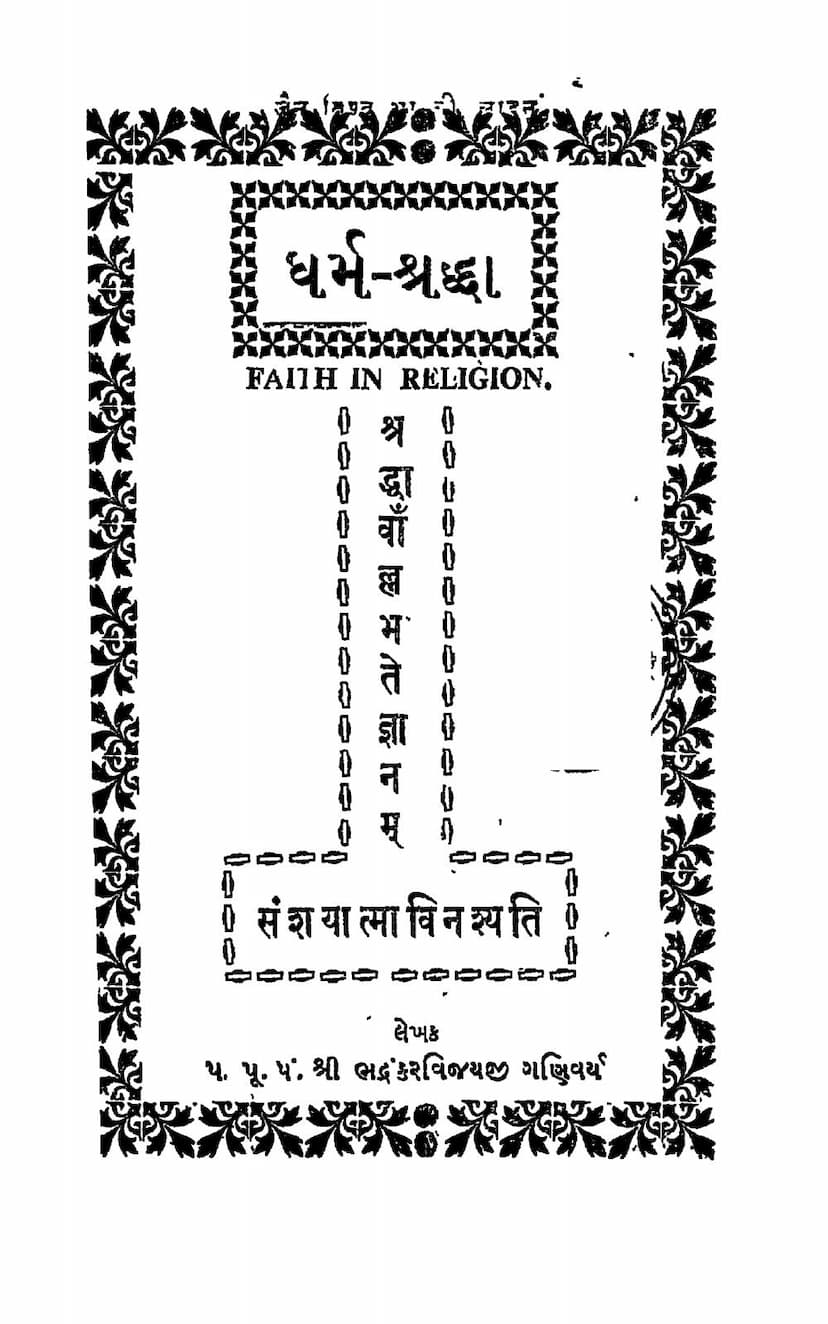Dharm Shraddha
Added to library: September 1, 2025

Summary
Here is a comprehensive summary of the Jain text "Dharm Shraddha" by Bhadrankarvijay:
The book "Dharm Shraddha" (Faith in Religion) by Pt. Pun. Pandit Shri Bhadrankarvijay Ganivarya, published by Bhadrankarsuri, emphasizes the paramount importance of faith in religion for spiritual progress and overall success in life.
Core Message: The Indispensable Role of Faith (Shraddha)
The central thesis of the book is that while knowledge (Gyan) and conduct (Charitra) are essential components of the path to liberation (Moksha), faith (Darshan/Shraddha) is the foundational and indispensable prerequisite.
- Interdependence of Gyan, Charitra, and Darshan: The author begins by referencing the foundational Jain principle from Umaswatiji's Tattvarthadhigama Sutra: Samyagdarshan (Right Faith), Samyagyan (Right Knowledge), and Samyakcharitra (Right Conduct) together constitute the path to Moksha. Without Right Faith, knowledge becomes ignorance, and conduct becomes mere bodily austerity without spiritual merit.
- Faith in Everyday Life: The book illustrates the necessity of faith through various examples: a child's faith in their mother, a student's faith in their teacher, an employee's faith in their employer, and reciprocal faith between spouses, citizens and rulers, and disciples and gurus. This faith fosters smooth interactions and mutual trust.
- Consequences of Lack of Faith: The absence of faith and trust leads to the deterioration of relationships, blockage of progress, and chaos. If even ordinary, worldly tasks require faith for success, then the profound spiritual quest for liberation is impossible without it.
- Faith as the Illuminator: Faith is presented as the element that adorns knowledge, illuminates conduct, and enhances actions. It is the essential catalyst for the success of all spiritual endeavors. To achieve spiritual and, consequently, global progress, strengthening faith should be prioritized above all other efforts.
The Nature and Source of True Faith:
- Faith is not Blind Adherence: The author clarifies that faith in religion is not blind imitation or thoughtless adherence. It is rooted in understanding and a desire for welfare.
- True Faith Arises from True Sources: The most effective and safest way to strengthen faith is to regularly listen to the pure knowledge found in Jain scriptures (Jinagam) directly from knowledgeable and virtuous spiritual leaders (authoritative figures). Other sources like modern education or random discourses are deemed insufficient or potentially misleading for cultivating genuine religious faith.
- Faith Grows from Faith: True faith is cultivated by encountering and learning from those who possess faith and exemplary conduct. These individuals are like stable lamps, capable of igniting the faith and knowledge in others.
Addressing Doubts and Criticisms:
- Religion and Sectarianism: The book acknowledges that religious divisions can sometimes foster envy and intolerance. However, it argues that divisions are a natural human tendency for organization and enthusiasm. The critique should focus on the negative aspects of divisions, not on eliminating religion itself.
- Carelessness Towards Religion: The author identifies several reasons for the modern decline in religious devotion: the rise of materialism and related education, increased indulgence in luxury making renunciation difficult, and egoism that resists the idea of following religious injunctions.
- Dharma as a Framework for Discipline: Religion, for the Jain perspective presented, is not about unchecked freedom but about establishing limitations and discipline. These limitations, like those on desires, violence, speech, and indulgences, are seen as essential for human dignity and for achieving a peace beyond sensory pleasures.
- The Importance of Jain Scriptures (Jinagam): Jain scriptures are highlighted as the primary basis for Dharma, being inspired by omniscient beings. They are repositories of righteous conduct, devotion, and philosophical truths, guiding individuals towards paths of truth, compassion, austerity, celibacy, and purity.
- Dharma as the Ultimate Support: In times of distress and when worldly relationships and possessions fail, Dharma is the ultimate solace and support for the soul.
Key Jain Concepts Discussed:
The book delves into various essential Jain philosophical concepts in a question-and-answer format to foster faith:
- Omniscience (Sarvajna): Proving the existence of omniscient beings through logical arguments and scriptural evidence, emphasizing that their teachings are the ultimate source of truth.
- Syadvada (Anekantavada): Explaining the principle of manifold perspectives, where truth is understood through various relative viewpoints, leading to a comprehensive and non-contradictory understanding of reality. This is contrasted with dogmatic or one-sided views.
- Karma: Discussing the nature, operation, and consequences of karma, explaining how actions lead to experiences and how faith in this principle is crucial.
- Devotion (Bhakti): Defining true devotion as reverence for the liberated souls (Jinas) and their teachings, leading to spiritual growth.
- Liberation (Mukti): Describing the ultimate goal of Jainism as the state of pure, liberated souls, free from worldly suffering and rebirth.
- The Soul (Atma): Explaining the soul as an eternal, conscious entity distinct from the body, capable of achieving liberation through right faith, knowledge, and conduct.
- Prayer (Prarthana): Clarifying the true meaning of prayer in Jainism, emphasizing it as a sincere aspiration for spiritual qualities and liberation, rather than a request to a deity for worldly boons.
- The Significance of Jain Temples (Jin Mandir): Presenting temples as places of spiritual solace, guidance, and connection to the divine.
- The Importance of Jain Rituals and Practices: Discussing the philosophical underpinnings of practices like idol worship, dietary restrictions, and observances, highlighting their role in spiritual discipline and faith development.
- The Value of Dharma: Ultimately, the book extols Dharma as the supreme, eternal, and benevolent path to liberation and well-being, which is the true inheritance for humanity.
Concluding Thought:
The book strongly advocates for a faith that is not blind but informed and deeply rooted in spiritual understanding. It encourages readers to cultivate this faith through diligent study, association with the virtuous, and consistent practice, leading to true welfare and ultimate liberation.